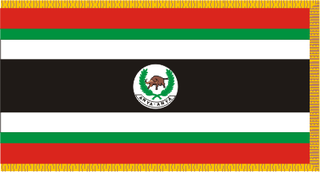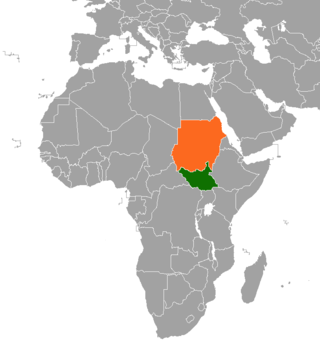Contents
| |||||
| Decades: | |||||
|---|---|---|---|---|---|
| See also: | |||||
Events in the year 2018 in South Sudan .
| |||||
| Decades: | |||||
|---|---|---|---|---|---|
| See also: | |||||
Events in the year 2018 in South Sudan .

Sudan, officially the Republic of the Sudan, is a country in Northeast Africa. It borders the Central African Republic to the southwest, Chad to the west, Libya to the northwest, Egypt to the north, the Red Sea to the east, Eritrea and Ethiopia to the southeast, and South Sudan to the south. Sudan has a population of 50 million people as of 2024 and occupies 1,886,068 square kilometres, making it Africa's third-largest country by area and the third-largest by area in the Arab League. It was the largest country by area in Africa and the Arab League until the secession of South Sudan in 2011; since then both titles have been held by Algeria. Sudan's capital and most populous city is Khartoum.

Currently, the politics of Sudan takes place in the framework of a federal provisional government. Previously, a president was head of state, head of government, and commander-in-chief of the Sudanese Armed Forces in a de jure multi-party system. Legislative power was officially vested in both the government and in the two chambers, the National Assembly (lower) and the Council of States (higher), of the bicameral National Legislature. The judiciary is independent and obtained by the Constitutional Court. However, following a deadly civil war and the still ongoing genocide in Darfur, Sudan was widely recognized as a totalitarian state where all effective political power was held by President Omar al-Bashir and his National Congress Party (NCP). However, al-Bashir and the NCP were ousted in a military coup which occurred on April 11, 2019. The government of Sudan was then led by the Transitional Military Council or TMC. On 20 August 2019, the TMC dissolved giving its authority over to the Sovereignty Council of Sudan, who were planned to govern for 39 months until 2022, in the process of transitioning to democracy. However, the Sovereignty Council and the Sudanese government were dissolved in October 2021.

Omar Hassan Ahmad al-Bashir is a Sudanese former military officer and politician who served as Sudan's head of state under various titles from 1989 until 2019, when he was deposed in a coup d'état. He was subsequently incarcerated, tried and convicted on multiple corruption charges. He came to power in 1989 when, as a brigadier general in the Sudanese Army, he led a group of officers in a military coup that ousted the democratically elected government of prime minister Sadiq al-Mahdi after it began negotiations with rebels in the south; he subsequently replaced President Ahmed al-Mirghani as head of state. He was elected three times as president in elections that have been under scrutiny for electoral fraud. In 1992, al-Bashir founded the National Congress Party, which remained the dominant political party in the country until 2019. In March 2009, al-Bashir became the first sitting head of state to be indicted by the International Criminal Court (ICC), for allegedly directing a campaign of mass killing, rape, and pillage against civilians in Darfur. On 11 February 2020, the Government of Sudan announced that it had agreed to hand over al-Bashir to the ICC for trial.

Dr. John Garang De Mabior was a Sudanese politician and revolutionary leader. From 1983 to 2005, he led the Sudan People's Liberation Army/Movement as a commander in chief during the Second Sudanese Civil War. He served as First Vice President of Sudan for three weeks, from the comprehensive peace agreement of 2005 until his death in a helicopter crash on July 30, 2005. A developmental economist by profession, Garang was one of the major influences on the movement that led to the foundation of South Sudan’s independence from the rule of Sudanese president Omar al-Bashir.

Salva Kiir Mayardit, commonly known as Salva Kiir, is a South Sudanese politician who has been the President of South Sudan since its independence on 9 July 2011. Prior to independence, he was the President of the Government of Southern Sudan, as well as First Vice President of Sudan, from 2005 to 2011. He was named Commander-in-Chief of the Sudan People's Liberation Army (SPLA) in 2005, following the death of John Garang.

The Anyanya were a southern Sudanese separatist rebel army formed during the First Sudanese Civil War (1955–1972). A separate movement that rose during the Second Sudanese Civil War were, in turn, called Anyanya II. Anyanya means "snake venom" in the Ma'di language.

The politics of South Sudan concern the system of government in the Republic of South Sudan, a country in East Africa, and the people, organizations, and events involved in it.

The South Sudan People's Defence Forces (SSPDF), formerly the Sudan People's Liberation Army (SPLA), is the military force of the Republic of South Sudan. The SPLA was founded as a guerrilla movement against the government of Sudan in 1983 and was a key participant of the Second Sudanese Civil War, led by John Garang. After Garang's death in 2005, Salva Kiir was named the SPLA's new Commander-in-Chief. As of 2010, the SPLA was divided into divisions of 10,000–14,000 soldiers.
Peter Gatdet Yak, better known as Peter Gadet, was a South Sudanese general and SPLA commander who became the leader of the South Sudan Liberation Army (SSLA), a rebel movement in South Sudan.

South Sudan, officially the Republic of South Sudan, is a landlocked country in East Africa. It is bordered on the north by Sudan; on the east by Ethiopia; on the south by the Democratic Republic of the Congo, Uganda and Kenya; and on the west by the Central African Republic. South Sudan's diverse landscape includes vast plains and plateaus, dry and tropical savannahs, inland floodplains, and forested mountains. The Nile River system is the defining physical feature of the country, running south to north across its center, which is dominated by a large swamp known as the Sudd. South Sudan has a population of 12.7 million. Juba is the capital and largest city.
The history of South Sudan comprises the history of the territory of present-day South Sudan and the peoples inhabiting the region.

Paul Malong Awan, also known as Paul Malong Awan Anei, King Paul, and General Paul, is a South Sudanese politician and military figure. Until 16 May 2017 he was the Chief of General Staffs (COGS) of the Sudan People’s Liberation Army (SPLA). The Chief of General Staffs was the highest-ranking military officer in the SPLA, and also the principal military adviser to the President of the Republic of South Sudan and the National Security Council.

The Heglig Crisis was a brief war fought between the countries of Sudan and South Sudan in 2012 over oil-rich regions between South Sudan's Unity and Sudan's South Kordofan states. South Sudan invaded and briefly occupied the small border town of Heglig before being pushed back by the Sudanese army. Small-scale clashes continued until an agreement on borders and natural resources was signed on 26 September, resolving most aspects of the conflict.
The South Sudan Air Force (SSAF), also previously known as the Sudan People's Air Force or Sudan People's Liberation Air Force, is the air force of the South Sudan People's Defense Forces (SSPDF) of South Sudan. The headquarters are located in Juba Air Base, Juba.

The South Sudanese Civil War was a multi-sided civil war in South Sudan fought from 2013 to 2020, between forces of the government and opposition forces. The Civil War caused rampant human rights abuses, including forced displacement, ethnic massacres, and killings of journalists by various parties. Since its end South Sudan has been governed by a coalition formed by leaders of the former warring factions, Salva Kiir Mayardit and Riek Machar. In 2024, the country continues to recover from the war while experiencing ongoing and systemic ethnic violence.

The Sudan People's Liberation Movement-in-Opposition, also known as the anti-governmental forces (AGF), is a mainly South Sudanese political party and rebel group that split from the Sudan People's Liberation Movement in 2013, due to political tensions between President Salva Kiir and Vice President Riek Machar over leadership of the SPLM. Tensions grew between forces loyal to Kiir and Machar and South Sudan plunged into the South Sudanese Civil War.

The South Sudan Opposition Alliance is a coalition of political parties and armed groups in South Sudan that opposed the government of President Salva Kiir. It was formed in February 2018 in Addis Ababa, Ethiopia, by nine groups. In September the alliance acceded to a revised peace deal with the government that also included the main rebel faction, the Sudan People's Liberation Movement-in-Opposition, but some of the member groups disagreed with the decision and split from the alliance. The pro-deal SSOA has experienced continued tension between its members, as well as with the government.
A coup d'état took place in Sudan in the late afternoon on 11 April 2019, when President Omar al-Bashir was overthrown by the Sudanese Armed Forces after popular protests demanded his departure. At that time, the army, led by Ahmed Awad Ibn Auf, toppled the government and National Legislature and declared a state of emergency in the country for a period of 3 months, followed by a transitional period of two years before an agreement was reached later.

Abdel Fattah al-Burhan Abdelrahman al-Burhan is a Sudanese army general who is the de facto ruler of Sudan. Following the Sudanese Revolution in April 2019, he was handed control of the military junta, the Transitional Military Council, a day after it was formed, due to protesters' dissatisfaction with the establishment ties of initial leader Ahmed Awad Ibn Auf. He served as chairman of the TMC until a draft constitutional declaration signed with civilians went into effect on 17 August and a collective head of state Transitional Sovereignty Council was formed, also to be initially headed by al-Burhan.
This article lists events from the year 2020 in South Sudan